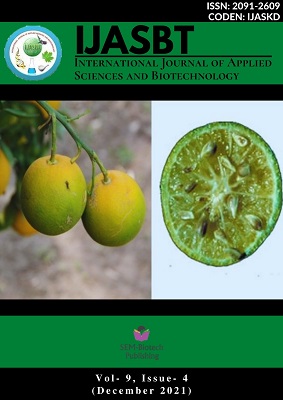Understanding Citrus Greening Disease and Its Possible Management Strategies in Nepal
DOI:
https://doi.org/10.3126/ijasbt.v9i4.40805Keywords:
citrus production, HLB in Nepal, citrus greening managementAbstract
Huanglongbing (HLB), also known as citrus greening, is a devastating disease of citrus that has decimated several citrus orchards throughout the world. The disease is associated with three species of unculturable and phloem-limited bacteriae, Candidatus Liberibacter asiaticus, Candidatus Liberibacter africanus and Candidatus Liberibacter americanus. The most common species of bacteria found in Nepal is Candidatus Liberibacter asiaticus which is transmitted by an insect vector, Asian citrus psyllid (Diaphorina citri). This disease has been detected in several economically important citrus production areas of Nepal, which resulted in heavy yield loss. No cure for the disease has been discovered yet and it is essential to practice proper management strategies to maintain citrus health and sustain citrus production under HLB pressure. Several disease management approaches such as pathogen-free nursery establishment, use of disease tolerant rootstock cultivars, proper irrigation and nutrient supply, removal of HLB affected trees, and control of psyllid with frequent insecticide application are widely practiced throughout the world. This review article highlights the characteristics of the citrus greening disease and its insect vector and gives insights into their management techniques. Several technologically advanced options available to minimize the HLB infection might not be feasible currently in Nepal due to economic and topographic constraints. This article also aims to bring into focus the cost-effective methods that growers in Nepal can practice to mitigate the impact of HLB disease in their citrus orchards.
Int. J. Appl. Sci. Biotechnol. Vol 9(4): 227-238.
Downloads
Downloads
Published
How to Cite
Issue
Section
License
Copyright (c) 2021 International Journal of Applied Sciences and Biotechnology

This work is licensed under a Creative Commons Attribution-NonCommercial 4.0 International License.




